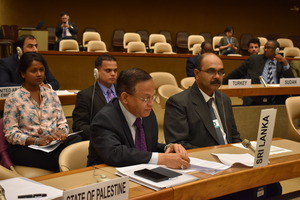
"Practical achievement of the target of a world free of cluster munitions demands great dedication, concerted vision and collective initiatives and responses", stated Ambassador A.L.A Azeez, Permanent Representative of Sri Lanka to UNO in Geneva, at the closing session of the 8th Meeting of the State Parties to the Convention on Cluster Munitions in Geneva today, in acceptance of the Presidency of the 9th Meeting of the States Parties (9 MSP-2019).
During the three-day meeting that commenced on 3rd September 2018, Sri Lanka was specially commended for joining this key humanitarian disarmament Convention aimed at banning production, storage, transfer and use of cluster munitions. Sri Lanka acceded to the Convention on 1 March 2018, as the 103rd State Party.
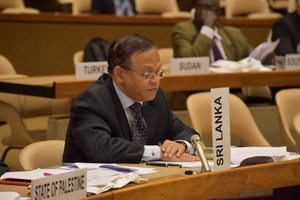
Addressing the Eighth Meeting of States Parties to the Convention on Cluster Munition today, Ambassador A.L.A Azeez, Permanent Representative of Sri Lanka reaffirmed Sri Lanka's commitment to working towards achieving universalisation and to advancement of the objectives of the Convention. The Meeting of States Parties welcomed Sri Lanka as the 103rd State Party, and looked forward to Sri Lanka's leadership in humanitarian disarming.
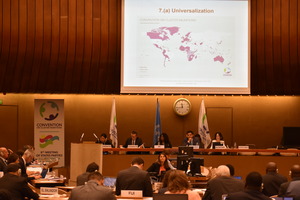
The Statement delivered by Ambassador Abdul Azeez
Permanent Mission of Sri Lanka to UN in Geneva
03rd September 2018
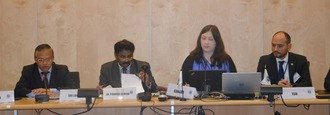
Addressing the forum on ‘individualized approach’ on the sidelines of the Intersessional Meeting of the Anti-Personnel Mine Ban Convention today, Sri Lanka Permanent Representative Ambassador Azeez recounted how Sri Lanka achieved success in what was considered a perilous task in 2009.
Ambassador Azeez highlighted Sri Lanka’s engagement in demining activity as one which had its own complexity and uniqueness. The National Policy on Reconciliation and Co-existence, in place in Sri Lanka since 2017, both underpinned and nourished the ongoing programmes of peacebuilding and development in the country, he stressed.
The Sri Lanka delegation to the Intersessional Meeting that took place in Geneva from 7-8 June, was led by P. Suresh, Secretary to the Ministry of Resettlement, Rehabilitation, Northern Development and Hindu Religious Affairs and Director of the National Mine Action Centre. Delivering a national statement at the Intersessional Meeting, he thanked the partner countries and partner organizations for the assistance provided for Sri Lanka Mine Action Programme, which he stated was expected to be completed by 2020.
Statement delivered by Ambassador Azeez
Permanent Mission of Sri Lanka
Geneva
8 June 2018
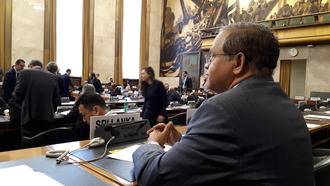
Delivering his initial address to the Conference of Disarmament (CD) of the United Nations, Ambassador Azeez stated that the inaction in the CD over the past twenty years has only led to the loss of a generation of professionals and experts in the field of Disarmament. He stressed “the gap in Disarmament Education is now all too glaring".
Thanking Sweden and Switzerland for giving leadership to the CD at this most crucial time, followed by Sri Lanka early this year, the Permanent Representative of Sri Lanka added that negotiations in the CD, by their very nature, involved addressing challenging issues, exchange of perspectives, and understanding.
The essential task of that process remained as one of endeavouring to achieve consensus outcomes. The eventual goal of general and complete disarmament underpinned the fulfilment of that task, he emphasised.
Permanent Mission of Sri Lanka
Geneva
22 May 2018
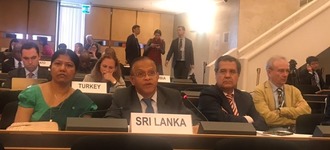
“Building a better and secure future for all is a shared call that we can shirk only at our own peril”, stated Ambassador A.L.A.Azeez, Sri Lanka’s Permanent Representative to the UN in Geneva, addressing the Second Preparatory Committee Meeting of State Parties to the Nuclear Non-Proliferation Treaty (NPT) today.
Ambassador Azeez highlighted the importance of the NPT as the global regime for nuclear non-proliferation and disarmament that called for a balanced and non-discriminatory approach to building international peace and security. He stressed that the non-proliferation treaty regime should be taken forward, while promoting and safe guarding the economic development prospects for all, through equal access to the technology advancing peaceful uses of nuclear energy.
He also called upon the State Parties to seriously address the prevalent dichotomy between the lack of progress in disarmament and increasing emphasis and efforts on non-proliferation, urging them to “manifest their support for, and investment in, disarmament training and education provided by the UN and other organizations” .
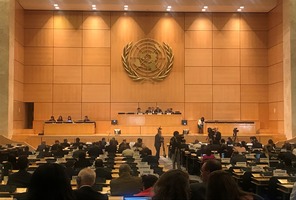
The Second Preparatory Meeting that began its deliberations on 23rd April 2018 in Geneva would continue until 4th May 2018 and is aimed to help evolve a negotiated outcome at the NPT Review Conference to be held in New York in April/May 2020.
Permanent Mission of Sri Lanka to UN in Geneva
24th April 2018
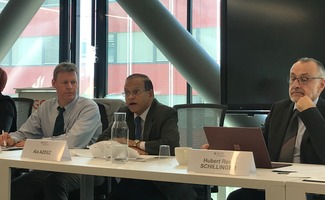
The window of opportunity that was opened up, and the positive spirit generated in moving forward the substantive work in the Conference of Disarmament (CD) with the adoption of Decision 2119 under the Presidency of Sri Lanka, ’can be carried through to creatively looking at ways and means of arriving at a negotiated outcome at the 2020 NPT Review Conference,’ said Ambassador A.L.A. Azeez, Permanent Representative of Sri Lanka in Geneva. He made these remarks chairing a panel session titled ‘ Reviving the NPT and Conference on Disarmament: Means and Processes to Ensure Success’ at the Framework Forum Roundtable, co-organized in Geneva on 19th April 2018, by the Geneva Centre for Security Policy (GCSP) and several other organizations.
Echoing the words of the UN Secretary General who stated that “it is time to translate the Decision into resumption of negotiations”, Ambassador Azeez added “this development has come up at a critical time when there is growing impatience among the non-proliferation and disarmament community over the long spell of ‘inaction’, spanning over two decades”.
Noting that the second round of consultations of the parties to the Treaty on Non-Proliferation of Nuclear Weapons, are to commence next week in Geneva, to prepare for the NPT review in 2020, Sri Lanka’s Permanent Representative remarked “While non-proliferation should receive a clear focus along with a pronounced emphasis on peaceful use of nuclear energy, the advancement of these objectives would be effective and meaningful when sustained efforts towards the eventual elimination of nuclear weapons follow in tandem”. He said “it was time to be imaginative, yet pragmatic”.
Mr. Sico van der Meer, Clingendal Institute, the Netherlands, and Ms. Tarja Cronberg, Chair,Middle Powers Initiative, Stockholm International Peace Research Institute(SIPRI), joined this panel as speakers addressed ‘How to make the NPT RevCom in 2020 a success?’ and ‘Long term reform needs for the NPT survival?’ respectively.
Permanent Mission of Sri Lanka
Geneva
20 April 2018
- The Impact of Technology and Artificial Intelligence (AI) on Achieving the SDGs is Becoming Apparent
- "Sri Lanka makes its best contributions to the international community when it leads from the centre" - Ambassador Aryasinha
- Sri Lanka’s leadership at the Geneva based Conference on Disarmament commended
